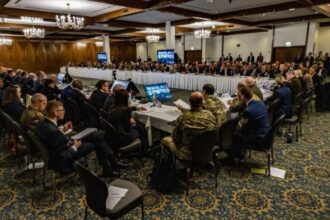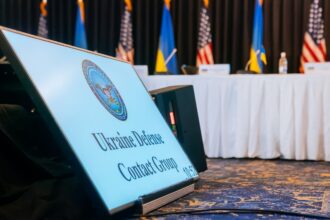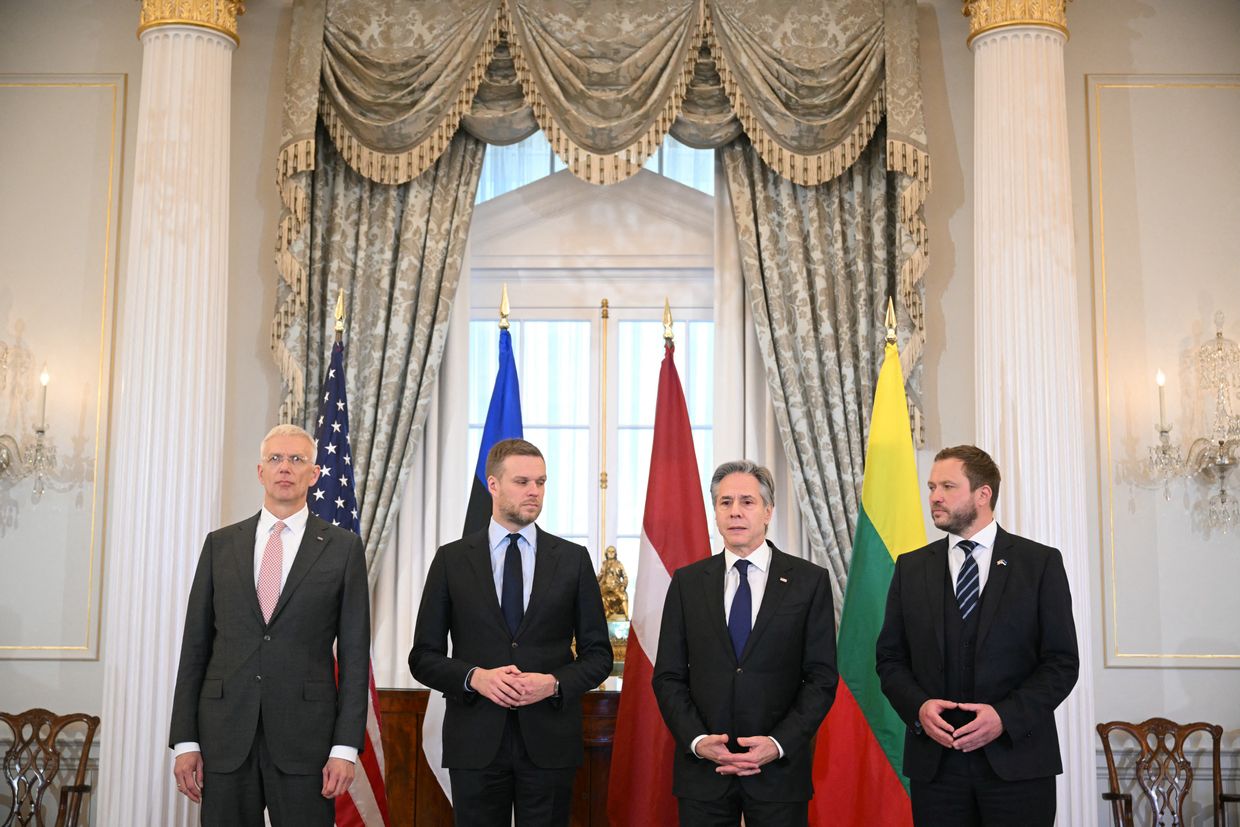Zygimantas Pavinis, a Lithuanian member of parliament, believes that history is repeating: the Kremlin has its military sights set on Europe beyond Ukraine, and the U.S. does not listen to warnings coming from the Baltics.
Pavilionis said that Americans are arrogant and don’t listen to Europe.
Russia’s recent actions in the Baltic States — Estonia, Latvia and Lithuania — and in nearby Finland and Sweden have raised concerns about its intentions.
In the last year, Russia made several moves around the Baltic Sea, including jamming GPS, removing boundary markers from the Narva River, which separates Russia from Estonia, and making a brief attempt at changing the maritime border between Lithuania & Finland.
Micael Byden warned earlier in May that the Kremlin could be attempting to dominate the Baltic Sea, and had his eye on Sweden’s Gotland island.
There have been many changes since 2014, when Russia began its aggression against Ukraine and Baltic officials said that their warnings about larger Russian threats to the Trans-Atlantic Community were often ignored.
Despite the full-scale invasion of 2022, and recent escalation, some Baltics claim that Washington is still not heeding their warnings about the threat of Russia. The countries know this threat intimately, after more than half a century under Soviet occupation, and decades of living on the border of modern-day Russia. This makes them some of Ukraine’s strongest advocates in Washington.
If they had listened, aid to Ukraine would not have been delayed. Kyiv would have gotten its wish to lift the ban on long-range weapons made in Western countries that could be used to strike inside Russia to cripple its war machines, and NATO might even consider strengthening its eastern flank.
The upcoming U.S. presidential election is also a high-stakes event, as Donald Trump could return to the White House. The former Republican President, who espouses isolationist views has criticized aid for Ukraine, flaunted repeatedly his relations with Russian president Vladimir Putin, and questioned NATO’s existence.
Trump’s nominee for vice president, JD Vance, has said that he “doesn’t care” what happens in Ukraine. This has led to fears of a Republican-led U.S. that would be the worst thing to happen to Ukraine and the entire area.
Pavilionis claims that only one Republican who was skeptical of the $61 billion aid package for Ukraine, which had been stalled, met with a Baltic delegation in February. This is why he has called on members of Congress both then and now to “wake-up.”
“(American isolation would mean war in Baltics),” he told Kyiv Independent.
‘A lot to explain’
The three Baltic nations do not sit idle, even though war is unlikely to occur in the near future. Estonia, Latvia, Lithuania and Finland are the top NATO spenders on defense.
Estonia will spend 3.43% of its gross domestic product on defense by 2024. This is well above the NATO guidelines of 2% and America’s 2.7%. This is a significant drop from the 5.7% spent during Cold War.
Lithuania recently announced that it had fortified and blocked a bridge across the Nieman River connecting it to the Russian Exclave of Kaliningrad.
They also lobby for Ukraine because of their knowledge of the threats. These include cyber attacks as well as maritime threats.
Many lawmakers who spoke to the Kyiv independent said that there is a bipartisan consensus on the fact that the Baltic States remain some of Washington’s most effective voices for further support for Ukraine.
“There are probably no better advocates of Ukraine than the Baltics countries,” Republican congressman Don Bacon said, who is also co-chairman of the House Baltics Caucus.
The high level of military support for Ukraine is a testament to their support and understanding of risks.
The Baltic States, despite having less population than New York City collectively, were among the four top donors of aid to Ukraine in this summer.
According to a Senate aide who spoke under condition of anonymity, while some Republicans continue to criticize European countries because they don’t spend the same percentage of their budgets on aid for Ukraine, it is appreciated that the Baltics have done more than their share in supporting Kyiv.
It is another matter to convince its Western allies of the need to act decisively on behalf of Ukraine.
“It’s a lot of explaining,” Estonia’s U.S. The Kyiv Independent quoted Ambassador Kristjan Prikk, who described how he explains U.S. officials why the Russian war in Ukraine is not just about Putin wanting Kyiv but also his undermining the U.S.
“Our role has often been to explain to people the issues at stake.”
He said that when Ambassador Prikk was in Washington, over a decade earlier, during the three years prior to Crimea’s annexation of Crimea, it was extremely difficult to explain Russia’s threats to the West. His warnings about Russia’s threats against European security were sometimes ignored.
I met today with the Speakers of Baltic states to discuss challenges that our countries face. We discussed the importance of deterring threats like China, Russia, and Iran, and we noted the importance of viable U.S. energy production for the Baltics and the risks posed… pic.twitter.com/RUNAV6DKOx– Speaker Mike Johnson (@SpeakerJohnson) January 30, 2024
“(Baltic Countries) have a great story to tell, and people are listening to a certain extent,” Jeremy Shapiro said, a U.S. expert on foreign policy at the European Council on Foreign Relations.
In February, when Ukraine’s $61-billion aid package was being held up in Washington by the Republican House Speaker Mike Johnson, parliamentary speaker from each Baltic nation met him, sending a message that Russia would act if there were any signs that Western support for Ukraine was waning.
Johnson received a letter from his Baltic counterparts in April, shortly before allowing aid to pass, requesting that he deliver “indispensable assistance” to Ukraine.
The letter stated that “Supporting Ukraine represents an investment in our collective future security.”
Prikk claims that the Baltics are more listened to due to their “credibility”, given the Russian drones that exploded in Latvia, and other examples of how close the region is to Russia. But it’s a constant battle.
He said that explaining Russia’s threats to Washington was like cycling. You can’t stop pedaling because of the Middle East’s expanding war, the Cold War-era Washington officials’ elongated presence, and the rapid news cycle.
Expanding NATO’s presence to the east
Some would like to see NATO’s military presence in the Baltics increase as tensions between Russia, NATO and the United States escalate.
Congressman Bacon said that the U.S. should do more to strengthen air defenses in Baltics. This would likely mean more American troops in this region.
Rep. Bacon, a retired Air Force General, said: “We must be there to deterrence.” “I know that the Russians are aware of our presence and that is what matters.”
Chuck Grassley (a Republican Senator and member of the Senate Baltic Freedom Caucus) said that Russia should know that the U.S. was ready to defend their obligations to NATO members.
“It’s important that the U.S. make it very clear that the Baltics are in our sphere, and not Russia’s.”
“We need to spend more money on our own defence because we are relatively weak right now,” Sen. Grassley stated, referring to the preparedness of Americans in the face hostile hostility. “I don’t really feel secure.”
There are still disagreements on Capitol Hill about whether or not more U.S. soldiers should be stationed in the Baltics, near Russia’s westernmost NATO boundary. There is concern that more U.S. personnel in close proximity to Russia, be it troops in the Baltics, or diplomats in Ukraine could lead to escalation.
According to Ivo Daalder a former U.S. Ambassador, the Baltic states are likely to want a permanent presence a few border divisions. Ambassador to NATO.
“That is not going to happen, because if those (troops) are deployed there, they can’t be used elsewhere,” Daalder said.
Ambassador Prikk said the region doesn’t want more U.S. soldiers, but rather military training and a plan for defense. Even if Washington listened to the Baltics, there is still concern that Washington doesn’t fully understand the region.
Daalder said that it’s not because the U.S. doesn’t listen, but that the realities of having a global ally thousands of miles away come into play, when Russia’s threats are singular and existential to the Baltics, but not for the U.S. despite its criticism.
Pavilionis is also a former U.S. The Ambassador also expressed his hope that the next White House will focus on NATO enlargement in January.
The spectre Trump
The potential for a second Donald Trump presidency calls into question America’s commitment to alliances, not least due to the former president’s criticism of the alliances in the past.
Pavillionis says that the influence autocratic countries have on Republicans is one of the reasons he believes the Baltics should intensify their diplomatic efforts in Washington.
The U.S. State Department reported in September that the Russian state-run RT media outlet was actively working with Russian Intelligence to spread propaganda in America, partly to encourage U.S. viewers to vote for Trump.
The pro-Russian messages of Tucker Carlson and his ability to retain the ear of Republican elected officials are of particular concern for the Baltics.
Sen. Grassley expressed his “worry” over the praise that some members of the party give to Carlson and Putin. He added that this is partly a message issue, as many Americans are unaware of the fact that billions of dollars of American aid is spent on Ukraine in the U.S.
Ambassador Prikk stated that navigating pro Kremlin sentiments among the right-wing in Washington was an unusual challenge.
Pavillionis said that when he was last in Washington, in early 2024 every third Republican on Capitol Hill spoke like Putin.
“We must stop this infiltration of autocracies within the Republican Party.”
Read More @ kyivindependent.com




